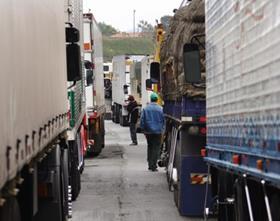
Kent County Council has warned that a no-deal Brexit could disrupt its food supply and cause gridlock on its roads in a damning report ahead of the parliamentary vote on Theresa May's Brexit deal on 11 December.
The 17-page report detailed the possible no-deal Brexit scenarios for the county, predicting 'prolonged disruption' to several vital services, such as schools and waste collection.
The council warned that changes to customs checks and border inspections at cross-Channel ferry terminals would likely cause major congestion and disrupt the food supply chain, with Kent’s roads expected to be worst affected.
Traffic could prove worse than the Operation Stack gridlock of 2015 when almost 7,000 HGVs were contained on the M20 in Kent, the council added.
Appealing to MPs ahead of the Brexit vote in parliament on 11 Deecember,council leader Paul Carter told The Guardian: “If we do not get a deal, the chances of disruption are great and we should never forget that.
“Think long and hard would be my advice to MPs voting next week. Let’s get the best deal through parliament. I think Theresa May’s deal is the best on offer.
“It may not be perfect but we need a vote for pragmatism. This gives us the time to negotiate some of the thorny issues and keeps a good working relationship with the EU that we need to ensure frictionless trade.”
Richard Burnett, chief executive of the Road Haulage Association, toldBBC Newsthat if the UK exited the EU without a deal, the customs process would be 'alarming'.
He said: 'If there's a slowing of that... people won't get the stuff when they want it because it won't be there. That's going to be catastrophic for us and the nation.'
A government spokesman responded: 'We have been working closely with Kent County Council – and all other local authorities – to make sure they have the support and resources they need to cope with Brexit in any scenario.
'That includes keeping the county's vital road networks moving so that local people, businesses, schools, and visitors face as little disruption as possible.'






No comments yet